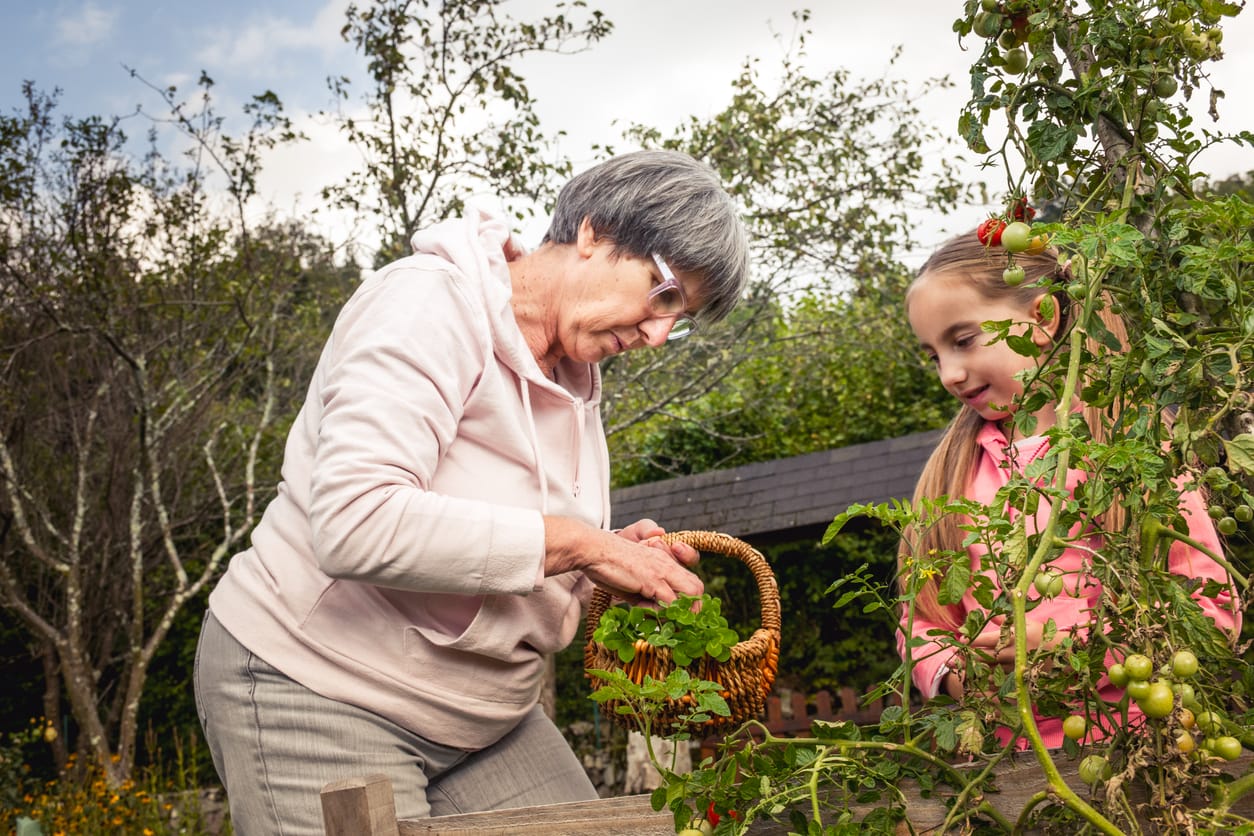We constantly explore activities that can enrich the lives of our elderly loved ones, and summer vegetable gardening stands out as a particularly beneficial choice. This engaging activity not only offers gentle physical exercise and access to fresh, nutritious produce but also serves as a mental stimulant, keeping seniors engaged and connected to the natural world. With this guide, we aim to make gardening an accessible and enjoyable pursuit for everyone, regardless of their previous experience. Here, we provide practical advice and simple tips to help you and your elderly loved one start gardening together, fostering health, happiness, and a deeper bond with nature.
Benefits of Gardening for Seniors
Gardening is more than just a pastime; it's a health-promoting activity that can significantly improve the quality of life for seniors. For those of us caring for elderly loved ones, incorporating gardening into their routine can provide extensive benefits across various aspects of their well-being. Here's how gardening can contribute positively to the lives of our seniors:
Physical Health Benefits
Gardening encourages seniors to engage in light physical exercise, crucial for maintaining mobility and flexibility. The simple tasks of planting, weeding, and watering not only keep seniors physically active but also help in managing their overall health by enhancing flexibility and stamina. Moreover, the time spent outdoors during gardening provides essential vitamin D from sunlight, vital for bone health and immune function.
Mental Wellness
Gardening serves as a therapeutic activity that can significantly alleviate stress and promote relaxation. The peaceful nature of gardening, coupled with the fresh air and rhythmic activities, offers a calming effect that is uniquely soothing. Additionally, the sense of accomplishment that comes from nurturing plants and watching them thrive can boost seniors' self-esteem and provide a lasting sense of achievement.
Nutritional Advantages
One of the standout benefits of gardening is the access to fresh, home-grown vegetables. This not only ensures a supply of fresh produce that is tastier but also richer in nutrients than what might be available at the store. Having a diet rich in fresh vegetables improves nutritional intake, which is crucial for seniors, providing them with the vitamins and minerals needed to support overall health. For caregivers and their elderly loved ones, gardening is not just a hobby; it is a fundamental part of a healthy lifestyle.
“A garden is a grand teacher. It teaches patience and careful watchfulness; it teaches industry and thrift; above all it teaches entire trust.”
Planning Your Garden
Planning a garden for your elderly loved one can be a rewarding endeavor that not only enhances their daily life but also encourages independence and engagement. Here's a simple guide to help you set up a garden that is both productive and senior-friendly:
- Choosing the Right Location: The location of the garden is crucial for its success. Look for a spot in the yard that receives ample sunlight and has easy access to water. This minimizes the effort required to maintain the garden. Consider using raised beds or container gardens to reduce the need for bending and reaching, making the gardening experience more comfortable and accessible for seniors with limited mobility.
- Selecting Vegetables: When choosing what to plant, opt for vegetables that are easy to grow and provide a sense of achievement. Starting with vegetables like tomatoes, cucumbers, peppers, and carrots can be particularly rewarding. These plants not only grow relatively easily but also produce bountiful yields that can add to the sense of accomplishment and pleasure for your elderly loved one.
- Tools and Accessibility: Equipping the garden with the right tools can significantly enhance the gardening experience. Opt for senior-friendly gardening tools that are ergonomically designed to be easier on the hands and back. Tools with longer handles can reduce the need to bend, while lightweight materials make them easy to handle. Additionally, consider incorporating garden stools or kneelers to provide comfortable seating and support while gardening, ensuring that your loved one can enjoy their time in the garden without discomfort.
By carefully planning and setting up the garden with these considerations, you can create a delightful and therapeutic environment for your elderly loved one, fostering both their physical health and mental well-being.
Step-by-Step Guide to Starting a Vegetable Garden
Creating a vegetable garden can be an enriching and therapeutic activity for your elderly loved ones, providing both physical exercise and the joy of nurturing growth. Here’s a caregiver-focused guide on how to start a vegetable garden with your elderly family member:
- Soil Preparation: Start with the soil, ensuring it's nutrient-rich and well-draining to support healthy plant growth. Together, you can amend the soil by adding compost or organic matter. This not only improves the soil's texture and fertility but also provides a light, easy activity that your loved one can manage, enhancing their sense of involvement and accomplishment.
- Planting: Choose the right time for planting based on your local climate and the specific vegetables you want to grow. When planting seeds or seedlings, involve your elderly loved one by guiding them on how to space the plants and sow the seeds at the right depth. This can help maintain their fine motor skills and encourage active participation.
- Watering: Proper watering is essential for a thriving garden. Introduce tools like a lightweight watering can or install a simple drip irrigation system that your loved one can easily manage. This ensures the garden receives a consistent amount of water, which is crucial, and also allows your elderly family member to contribute actively without the physical strain of traditional watering methods.
- Maintenance: Engage your elderly loved one in regular garden maintenance such as weeding and monitoring for pests. Opt for eco-friendly pest control methods and involve them in gentle activities like picking off larger pests or applying organic sprays. This helps them stay active and feel useful, which is great for their self-esteem and mental health.
- Harvesting: Teach your loved one how to recognize when vegetables are ripe for picking, which is a rewarding part of gardening. Harvesting provides a tangible reward for their efforts and can be a great moment to share success and joy. Make sure the methods and tools used are safe and easy for them to handle, allowing them to participate fully in the fruits of their labor.
By tailoring the gardening process to accommodate the needs and abilities of your elderly loved one, you not only foster an engaging and nourishing hobby but also enhance their quality of life through nature’s therapeutic benefits.
Safety Tips for Senior Gardeners
Gardening can be a delightful and beneficial activity for seniors, providing both physical activity and a connection to nature. However, ensuring safety is paramount when our elderly loved ones are involved. Here are some essential safety tips for senior gardeners that family caregivers should consider:
Sun Protection: Always make sure that your elderly loved one is well-protected from the sun. Encourage them to wear a wide-brimmed hat, sunglasses, and long-sleeved shirts to shield their skin and eyes from harmful UV rays. Applying broad-spectrum sunscreen is also crucial to protect their sensitive skin during outdoor gardening activities.
Using Lightweight Tools: Opt for gardening tools that are specifically designed to be lightweight and easy to handle. Ergonomic tools with padded handles can reduce strain on the hands and wrists, making gardening more comfortable for seniors. These tools help prevent fatigue and overexertion, allowing your loved one to enjoy their gardening time without the risk of injury.
Regular Breaks: It's important to monitor and remind your elderly loved one to take regular breaks. Continuous gardening without rest can lead to overexertion and fatigue, which are risks for more serious health issues. Set up a comfortable, shaded area nearby where they can sit, relax, and recuperate before continuing.
Staying Hydrated: Dehydration is a significant concern for seniors, especially when they are active outdoors. Always keep a bottle of water handy, and encourage your loved one to take regular sips, especially on warm days. Staying hydrated helps prevent heat-related illnesses and keeps energy levels stable.
Community and Social Aspects
Gardening can be a wonderful social activity for seniors, offering both physical and mental benefits and the opportunity to connect with family and community. Caregivers can turn gardening into a family affair by organizing regular gardening days where members of all ages can contribute, making it a fun and inclusive event. This not only helps seniors with the more demanding gardening tasks but also enhances the social enjoyment of the activity. Additionally, for those living in community settings or senior residences, setting up group gardening sessions can foster new friendships and encourage a team spirit, allowing elderly individuals to share their knowledge and learn from others.
Another enriching option for senior gardeners is to join or create a gardening club. Many communities have gardening clubs that welcome gardeners of all skill levels and ages, offering a platform to exchange gardening tips, seeds, and produce. If such a club doesn't exist nearby, caregivers can assist their loved ones in starting one by reaching out to local community centers, posting notices, and inviting neighbors and friends to join. Participating in a gardening club can help seniors maintain an active lifestyle, contribute to their community, and enjoy a sense of achievement and belonging.
In conclusion, summer vegetable gardening stands as a profoundly beneficial and joyful activity for seniors, offering both physical and mental stimulation along with the satisfaction of cultivating life. For caregivers looking to enrich the lives of their elderly loved ones, gardening proves to be a healthful and rewarding hobby. We encourage you to explore this wonderful pastime together, savor the nutritious fruits of your labor, and share your gardening successes with our community. Don’t forget to subscribe to our blog or newsletter for ongoing tips and seasonal advice, ensuring your gardening journey and that of your loved ones continues to thrive.





